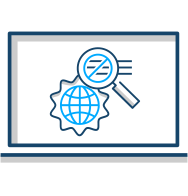We hope you find the answers to your export compliance questions below. If not, please contact us today.
What is export compliance?
The simple answer is that there is no best way to maintain export compliance. For an organization to be truly export compliant, there should be a program in place that includes the following export compliance best practices:
- Screening customers, suppliers, and other business parties against government watch lists—also known as restricted or denied party screening;
- Screening for sanctioned or embargoed countries;
- Classifying products and dual-use goods under Schedule B, USML, and the CCL;
- Managing knowledge, documentation, and access across business units or geographical locations;
- Managing licenses, exceptions, and exemptions under BIS export controls and other government agency regulations;
- Restricting access to controlled goods; and
- Facilitating and managing internal communication, education, and resolution resources.
Why do organizations have to screen individuals and entities?
The first step in most organizations' export compliance program is typically Denied Party Screening, also known as Restricted Party Screening, among other names. Screening is the process of helping to ensure that organizations do not do business with any party on a government or international watch list.
People and entities on these watch lists face trade restrictions due to reasons ranging from terrorism, criminal activity, and money laundering, among others. Doing business with these entities can lead to criminal and civil penalties, large monetary fines, imprisonment, negative press coverage, a hit to an organization's reputation, and a revocation of export privileges.
Our Denied Party Screening FAQ page goes into greater depth about denied party screening, and related obligations.
What watch lists should an organization screen against?
This varies from organization to organization. It depends on the location, or locations, in which a business operates, where they export, the nature of the products, technologies, and services, and the various parties involved with the transaction.
Some of the more common lists organizations screen against are:
- Export-related restricted, denied and blocked persons lists, such as the Department of Commerce Denied Persons, the Department of State Designated Terrorist Organizations, the Department of State Arms Export Control Act Debarred Parties, and the Weapons of Mass Destruction Trade Control Designations lists.
- Sanctions programs-related blocked persons lists, including the U.S. Treasury Department's Specially Designated Nationals and Blocked Persons, Foreign Sanctions Evaders and Sectoral Sanctions Identifications Lists, and the United Nations Consolidated List.
- General Services Administration lists help organizations that have government contracts (i.e., SAM and EPLS) search multiple U.S. General Services Administration Lists of Parties to help identify those (e.g., suppliers and vendors) excluded from receiving Federal contracts.
- Law enforcement-related wanted persons lists, such as the FBI Ten Most Wanted Fugitives, FBI Most Wanted Terrorists, Department of Homeland Security Investigations Most Wanted, U.S. Immigration and Customs Enforcement and Removal Operations Most Wanted, and the U.S. Secret Service Most Wanted List, to name just a few.
- Politically Exposed Persons and Office of Inspector General Lists.
- International Terrorist, Blocked Person, Wanted, and Entity Lists, such as the European Union Consolidated List, Interpol Recently Wanted, OSFI Consolidated Lists, HM Treasury Consolidated List, and additional international lists from other countries, including Australia and Japan.
As mentioned already, organizations should pick the lists it screens against based on the specific needs of the business. This is an area in which Descartes Visual Compliance can assist.
Why are exports regulated?
Governments around the world control exports for many reasons, including preventing controlled technology or dual-use goods from falling into the wrong hands. Exports are also regulated to advance foreign policy objectives, and to further economic and trade goals.
What are the main bodies that regulate exports?
In the United States, there are three primary U.S. government bodies that regulate exports:
- The Bureau of Industry and Security (BIS) regulates goods and technology that could potentially have dual-use military applications via the Export Administration Regulations (EAR). Items are regulated by the BIS through the Commerce Control List (CCL), which assigns an Export Control Classification Number (ECCN) to each item that appears on it;
- The Directorate of Defense Trade Control (DDTC) uses the International Traffic in Arms Regulation (ITAR) to control military goods and services that are listed on the United States Munitions List (USML), and
- The U.S. Treasury Department’s Office of Foreign Assets Control (OFAC) enforces economic and trade sanctions on specific countries and individuals.
Additionally, other countries and international organizations, such as the European Union, have their own departments enforcing export controls aligned with their policies and goals.
What are ITAR and EAR?
The International Traffic in Arms Regulations (ITAR) is enforced by the United States government via the United States Munitions List (USML). Items on the USML are defense and military-related goods and technology, and require a license or an exemption in order to be lawfully exported.
The Export Administration Regulations (EAR) are administered by the Bureau of Industry and Security (BIS). The EAR controls goods and technology that have commercial applications, but may also have military uses (i.e., dual use goods). Technology and goods are controlled by the EAR for a variety of reasons, including anti-terrorism, national security, foreign policy, and nuclear proliferation. These goods similarly require licenses, or exceptions, to be lawfully exported.
How do I know if our exports are regulated?
Organizations engaging in international trade and exports are responsible for complying with export regulations and controls. Companies are still subject to export controls and the laws governing them regardless of their awareness of them.
Having a solution in place that assists organizations with helping to determine export classifications, as well as managing licenses, where required, is a good step in the direction towards being export compliant.
What if our exports are subject to EAR or ITAR?
Should your organization determine that your exports are covered by either the EAR or ITAR, you must either apply for the appropriate license, determine whether they come under the purview of an exemption (ITAR) or determine if it is possible to get an exception (EAR).
What are licenses, exceptions, and exemptions?
If an item falls under the EAR or ITAR, a license is needed in order to export. Licenses are limited by time, value, or number of exports, and must be renewed upon expiry.
For items under the EAR, there are multiple categories of license exceptions. Should your organization’s goods qualify for these, you may not need an export license. The exceptions apply to limited cases, including public domain information, fundamental research, and educational information. If the items are on the CCL, and designated EAR99 (see below), they may not require a license unless they are being exported to an embargoed country or a restricted party.
For items on the USML, there are countries that may be exempt from needing licenses. Broad USML exemptions are largely blocked by the United States government in consideration of national security. However, there have been exemptions made for scientific research, and smaller scale exemptions arising from treaties in the past.
What is EAR99?
EAR99 is a designation on the BIS’ CCL. It acknowledges that an item is not on the CCL, but still subject to the EAR. EAR99 items can usually be exported without license, unless they are being exported to a sanctioned/embargoed country (such as Iran or North Korea), or a restricted/denied party.
What if our business can't get a license and/or an exception?
If an item is covered by the CCL or USML, and your organization cannot get a license, exception, or exemption, you will be unable to legally export said item.
Does our organization have to comply with export compliance laws?
Yes. All organizations doing business in the United States must adhere to U.S. regulations regarding export compliance. Organizations doing business in other countries may be subject to additional export regulations based on those countries’ jurisdictions as well.
Can I export something to someone within our company?
If an organization has subsidiaries and offices abroad, sending them items may count as exports, and be subject to the relevant export controls. This also includes the transfer of information, which may count as a "deemed export."
What is a "deemed export"?
Exports do not necessarily have to involve the physical transfer of goods or information out of the country. If, for example, controlled information is transmitted or exposed to a foreign national via electronic means, it counts as a "deemed export", even if said foreign national resides in the United States. Any organization can fall foul of deemed export violations, with educational institutions and research facilities known to be at high risk for such violations—inadvertent or otherwise.
What is export classification?
Government agencies and bodies regulate and control exports by assigning unique export codes or numbers to individual items and components. These classification codes typically denote which restrictions apply to each item, and organizations that import or export are expected to correctly classify their products, as well as adhere to the restrictions that come with them.
How many export classification regimes are there?
Each export control body has its own system of classification for exports. In the U.S., for example, the BIS uses ECCNs, ITAR uses USML, and additionally, the United States Census Bureau maintains Schedule B classification codes for exporting goods out of the U.S. Other countries around the world have their own classification systems that organizations should be mindful of and adhere to where necessary.
There are also Harmonized Tariff Schedule codes (HTS/HS) which are used by most countries throughout the world to classify imported products.
What if our organization is not based in the United States?
Any organization doing business in the United States, or with American citizens or organizations, has a legal obligation to meet American export compliance requirements, regardless of whether or not they are based in the U.S. Any transactions conducted in the U.S. dollar, or routed and processed through American financial institutions, come under the purview of OFAC. Additionally, organizations may also be bound by the export compliance regulations of the countries they are based out of and do business in.
How can our organization implement an export compliance program?
As detailed above, export compliance is comprised of a multifaceted and broad set of responsibilities. Organizations looking to get started on their compliance journey should typically look at starting with screening the parties with whom they do business. Screening should then be integrated into a larger compliance process that also includes classification of items and technologies (the latter to prevent deemed export violations from occurring).
Documents pertaining to export compliance should be also maintained, filed, and archived properly. This helps to ensure proper recordkeeping that proves due diligence, as proving your compliance is just as important as the act of complying in the case of a government audit.
While these activities can be performed manually, such as visiting government websites to perform denied party, and sanctioned and embargoed country screening, as well as searching for the appropriate classification codes, and the like, these can be time consuming and complex. This type of process also comes with a high probability for error and potentially erroneous recordkeeping. Export compliance solutions, such as the ones offered by Descartes Visual Compliance, save time and resources, reduce the scope for error, increase the comprehensiveness of a compliance program, and are generally an organization's best bet at getting—and staying—compliant.
Can Descartes Visual Compliance help our organization meet our export compliance goals?
Yes. Descartes Visual Compliance offers modular and affordable solutions that help organizations meet their specific export compliance needs. Among the solutions offered are:
- Restricted Party Screening, to help ensure an organization is not doing business with any party on a United States or international restricted party list;
- Export Classification, to help classify products and technology against classification regimes from around the world;
- Controlled Technology solutions, to help organizations meet their deemed export compliance needs;
- Export Automation, to help streamline the process of creating and maintaining export documentation, and applying for and renewing export licenses; and
- Audit and Recordkeeping, to help organizations maintain an audit trail of their screening, classification, and export compliance due diligence.
If you have any questions that were not answered here, contact us and we would be happy to answer them.
Related Products
For more information about screening software solutions
To learn more, call toll-free 1-877-328-7866 (Intl: 716-881-2590) and talk to one of our compliance consultants. They'll help you analyze your screening requirements, evaluate your options, and provide focused software demonstrations.




